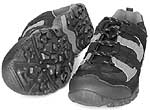Home Remedies for Athlete's Foot
Treating Athlete's Foot Naturally

Athlete's foot is a very common skin problem caused by a fungus, and unfortunately it is not limited to athletes. In an acute outbreak of athlete's foot, the skin on the foot becomes red or white, with cracks, scales, cuts, blisters and painful inflammation. Burning, stinging and itching can also occur. The most common place for athlete's foot to manifest itself is between the toes, but it can appear anywhere. Chronic athlete's foot causes the skin on the sides and the sole of the foot to become pink and scaly, but no itchiness generally accompanies the chronic variety.
The fungus that causes athlete's foot lives off of dead skin cells, and it thrives in warm, damp environments, such as those found in locker rooms and the areas around indoor swimming pools.
Athlete's foot is often confused with other conditions, such as dermatitis, allergic contact eczema, atopic eczema, psoriasis and erythrasma, so it is important to get a definitive diagnosis before starting treatment. In addition, you should consult your physician if you see an accumulation of pus in the cracks or blisters on the skin, or if your symptoms interfere with your day to day activities.
After treatment, it is important to take steps to avoid the infection from coming back. The fungus that causes athlete's foot is quite contagious, and it can be difficult to eradicate. Taking the following steps will help you avoid re-infection:
- Keep your feet as dry as possible, particularly between the toes where moisture can accumulate;
- Wear cotton socks, and change them at least once a day;
- Avoid tight, closed toed shoes. The moisture and heat built up by this type of footwear can cause athlete's foot fungus to thrive;
- Never go barefoot in public places. Always wear some sort of shoe, such as sandals or flip flops;
- Use a foot powder to keep your feet dry. Plain cornstarch makes a great foot dusting powder;
- Always wash your socks in the hot water setting of the washer.
There are many natural treatments to keep athlete's foot infections at bay. Some of the most effective are listed below.
Herbs and essential oils
Tea tree oil: Tea tree oil is the most common way to treat athlete's foot naturally, and one of the most effective. Tea tree oil is one home remedy that has proven to be as effective as over the counter athlete's foot medications. Tea tree oil contains anti-fungal qualities, and for best results it should be applied directly to the affected area three times per day. The usual dosage of tea tree oil is from four to ten drops. Treatment with tea tree oil should continue for two weeks after the infection seems to have disappeared to make sure that it is gone.
In addition to its use as a stand-alone therapy, tea tree oil can also be used in combination with aloe vera gel. A good approach is to mix about four ounces of aloe vera gel with 1/2 teaspoon of tea tree oil in a spray bottle and spray this on the affected area twice a day. The feet should then be allowed to dry completely before putting on socks and shoes. Tea tree oil is available at health food stores and on the Internet. When buying tea tree oil it is important to buy a 100% solution of the essential oil.
Grapefruit seed extract: Grapefruit seed extract has been shown to have strong anti-fungal effects. The best way to use this extract is to apply a few drops to the palm and rub it into the feet two or three times daily. Grapefruit seed extract can also be added to the washing machine when washing socks.
Diet and athlete's foot
Those with chronic athlete's foot conditions, or those who suffer from recurrent athlete's foot, are advised to avoid high consumption of breads, baked goods and other yeast containing products. It is thought that excessive consumption of yeast can exacerbate an athlete's foot outbreak. Vinegar and alcohol are also best avoided by chronic athlete's foot sufferers.
Article by Bonnie Conrad
|